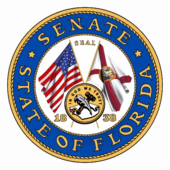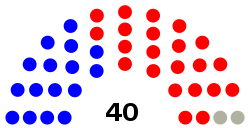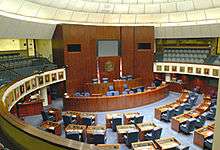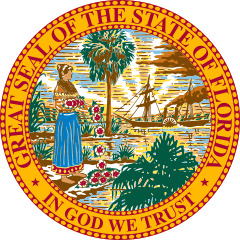Florida Senate
| Florida Senate | |
|---|---|
| 2016-18 Florida Legislature | |
 | |
| Type | |
| Type |
Upper house of the Florida Legislature |
Term limits | 2 terms (8 years) |
| History | |
| Founded | May 26, 1845 |
| Preceded by | Legislative Council of the Territory of Florida |
New session started | January 9, 2018 |
| Leadership | |
Senate President Pro Tempore | |
Senate Majority Leader | |
Senate Deputy Majority Leader | |
Minority Leader | |
| Structure | |
| Seats | 40 |
 | |
Political groups |
Majority
Minority
|
Length of term | 4 years |
| Authority | Article III, Florida Constitution |
| Salary | $18,000/year + per diem (Subsistence & Travel)[5] |
| Elections | |
Last election |
November 8, 2016 (40 seats) |
Next election |
November 6, 2018 (20 seats) |
| Redistricting | Legislative Control |
| Motto | |
| In God We Trust | |
| Meeting place | |
 | |
|
Senate Chamber Florida Capitol Tallahassee, Florida | |
| Website | |
| Official Website | |
The Florida Senate is the upper house of the Legislature of the U.S. State of Florida. Along with the House of Representatives, it composes the Florida Legislature. Article III, Section 1 of the Florida Constitution, adopted in 1968, defines the role of the Legislature and how it is to be constituted.[6] The Senate is composed of 40 members, each elected from a single-member district with a population of approximately 470,000 residents. Legislative districts are drawn on the basis of population figures, provided by the federal decennial census. Senators' terms begin immediately, upon their election. The Senate Chamber is located in the State Capitol building.
As of 2018, Republicans hold the majority in the chamber with twenty-two seats; Democrats are in the minority with sixteen seats.[7] Two seats are vacant, due to the resignation of Jack Latvala (R-Clearwater) following allegations of sexual harassment and public corruption, and the death of Dorothy Hukill (R-Port Orange).[8][9][10]
Titles
Members of the Senate are referred to as Senators. Because this shadows the terminology used to describe member of U.S. Senate, constituents and the news media, using The Associated Press Stylebook, often refer to them as State Senators to avoid confusion with their Federal counterparts.
Terms
Article III, of the Florida Constitution, defines the terms for State Legislators.
The Constitution requires State Senators from odd-numbered districts to be elected in the years that end in numbers of which are multiples of four. Senators from even-numbered districts are required to be elected in even-numbered years the numbers of which are not multiples of four.
To reflect the results of the U.S. Census and the redrawing of district boundaries, all seats are up for election in redistricting years, with some terms truncated as a result. Thus, senators in even-numbered districts were elected to two-year terms in 2012 (following the 2010 Census), and senators in odd-numbered districts will be elected to two-year terms in 2022 (following the 2020 Census).
All terms were truncated again in 2016, with all 40 Senate seats up for election, due to court-ordered redistricting.[11]
Legislators take office immediately, upon election.
Term limits
On November 3, 1992, almost 77% of Florida voters backed Amendment 9, the Florida Term Limits Amendment, which amended the Florida State Constitution, to enact eight-year term limits on federal and state officials. Under the Amendment, former members could be elected again after a two-year break.[12] In 1995, the U.S. Supreme Court ruled that states could not enact congressional term limits, but ruled that the state-level term limits could remain.[13]
Qualifications
Each legislator shall be at least twenty-one years of age, an elector and resident of the District from which elected and shall have resided in the state for a period of two years prior to election.[14]
Legislative Session
Each year during which the Legislature meets constitutes a new Legislative Session.
Committee Weeks
Legislators start Committee activity in September of the year prior to the Regular Legislative Session. Because Florida is a part-time legislature, this is necessary to allow legislators time to work their bills through the Committee process, prior to the Regular Legislative Session.[15]
Regular Legislative Session
The Florida Legislature meets in a 60-day Regular Legislative Session each year. Regular Legislative Sessions in odd-numbered years must begin on the first Tuesday after the first Monday in March. Under the State Constitution, the Legislature can begin even-numbered year Regular Legislative Sessions at a time of its choosing.[16]
Prior to 1991, the Regular Legislative Session began in April. Senate Joint Resolution 380 (1989) proposed to the voters a Constitutional Amendment (approved November 1990) that shifted the starting date of Regular Legislative Session from April to February. Subsequently, Senate Joint Resolution 2606 (1994) proposed to the voters a Constitutional Amendment (approved November 1994) shifting the start date to March, where it remains. The reason for the "first Tuesday after the first Monday" requirement stems back to the time when Regular Legislative Session began in April. Regular Legislative Session could start any day from April 2 through April 8, but never on April 1 -- April Fool's Day. In recent years, the Legislature has opted to start in January in order to allow lawmakers to be home with their families during school spring breaks, and to give more time ahead of the legislative elections in the Fall.[17]
Organizational Session
On the fourteenth day following each General Election, the Legislature meets for an Organizational Session to organize and select officers.
Special Session
Special Legislative Sessions may be called by the Governor, by a joint proclamation of the Senate President and House Speaker, or by a three-fifths vote of all Legislators. During any Special Session the Legislature may only address legislative business that is within the purview of the purpose or purposes stated in the Special Session Proclamation.[18]
Powers and process
The Florida Senate is authorized by the Florida Constitution to create and amend the laws of the U.S. state of Florida, subject to the Governor's power to veto legislation. To do so, Legislators propose legislation in the forms of bills drafted by a nonpartisan, professional staff. Successful legislation must undergo Committee review, three readings on the floor of each house, with appropriate voting majorities, as required, and either be signed into law by the Governor or enacted through a veto override approved by two-thirds of the membership of each legislative house.[19]
Its statutes, called "chapter laws" or generically as "slip laws" when printed separately, are compiled into the Laws of Florida and are called "session laws".[20] The Florida Statutes are the codified statutory laws of the state.[20]
In 2009, legislators filed 2,138 bills for consideration. On average, the Legislature has passed about 300 bills into law annually.[21]
In 2013, the legislature filed about 2000 bills. About 1000 of these are "member bills." The remainder are bills by committees responsible for certain functions, such as budget. In 2016, about 15% of the bills were passed.[22] In 2017, 1,885 lobbyists registered to represent 3,724 entities.[22]
The Senate also has the power to propose Amendments to the Florida Constitution. Additionally, the Senate has the exclusive power to try officials impeached by the House, and to confirm some executive appointments.
Leadership
The Senate is headed by the Senate President. The Senate President controls the assignment of committees and leadership positions, along with control of the agenda in their chamber. The Senate President, along with the Speaker of the House and Governor, control most of the agenda of state business in Florida.
- President of the Senate: Joe Negron (R)
- President Pro Tempore of the Florida Senate: Anitere Flores (R)
- Majority Leader of the Florida Senate: Wilton Simpson (R)
- Minority Leader of the Florida Senate: Oscar Braynon (D)
Composition
| 22 | 16 | |
| Republican | Democratic |
| Affiliation | Party (Shading indicates majority caucus) |
Total | ||
|---|---|---|---|---|
| Republican | Democratic | Vacant | ||
| Start of 2010–12 legislature | 28 | 12 | 40 | 0 |
| Start of 2012–14 legislature | 26 | 14 | 40 | 0 |
| Start of previous (2014–16) legislature | 26 | 14 | 40 | 0 |
| End of previous (2014–16) legislature | ||||
| Begin (November 2016) | 25 | 15 | 40 | 0 |
| April 21, 2017[23] | 24 | 39 | 1 | |
| September 26, 2017[24] | 16 | 40 | 0 | |
| October 27, 2017[25] | 15 | 39 | 1 | |
| January 5, 2018[26] | 23 | 38 | 2 | |
| April 10, 2018[27] | 16 | 39 | 1 | |
| October 2, 2018[28] | 22 | 38 | 2 | |
| Latest voting share | 57.9% | 42.1% | ||
Members, 2016–2018
*Elected in a special election.
District map

Past composition of the Senate
See also
External links
References
- ↑ "Treasure Coast's Joe Negron becomes Florida Senate president". TC Palm.
- ↑ "Anitere Flores named to Florida Senate leadership post". Miami Herald.
- 1 2 "Joe Negron announces Senate committee leadership, membership". Saint Petersblog.
- ↑ "Miami Gardens lawmaker installed as leader of Florida Senate's Democrats". Miami Herald.
- ↑ "The 2017 Florida Statutes F.S. 11.13 Compensation of members". Florida Legislature.
- ↑ "CONSTITUTION OF THE STATE OF FLORIDA". Florida Legislature.
- ↑ "Senators". Florida Senate.
- ↑ Caputo, Marc; Glorioso, Alexandra; Dixon, Matt (2017-10-27). "Clemens says he's resigning from state Senate after admitting to affair with lobbyist". Politico. Retrieved 2018-01-05.
- ↑ Bousquet, Steve (2017-12-20). "Jack Latvala resigns from the Florida Senate". Tampa Bay Times. Retrieved 2017-12-20.
- ↑ Harper, Mark (2018-10-02). "State Sen. Dorothy Hukill dies at age 72". Daytona Beach News-Journal. Retrieved 2018-10-02.
- ↑ "CONSTITUTION OF THE STATE OF FLORIDA". Florida Legislature.
- ↑ "Vote Yes On Amendment No. 9 To Begin Limiting Political Terms". Sun-Sentinel. 27 October 1992.
- ↑ Kevin Derby (11 February 2016). "Florida Backs Article V Convention for Constitutional Amendment on Congressional Term Limits". Sunshine State News.
- ↑ "CONSTITUTION OF THE STATE OF FLORIDA". Florida Legislature.
- ↑ "Editorial:Advice to Legislature:Pursue limited agenda". Florida Today.
- ↑ "CONSTITUTION OF THE STATE OF FLORIDA". Florida Legislature.
- ↑ Buzzacco-Foerster, Jenna (2016-02-18). "Proposal to move 2018 session to January heads House floor". Florida Politics. Retrieved 2016-02-18.
- ↑ "The Florida Constitution". Florida Legislature.
- ↑ "The Florida Senate Handbook" (PDF). Florida Senate.
- 1 2 "Statutes & Constitution: Online Sunshine". Florida Legislature. Retrieved 26 September 2013.
- ↑ Flemming, Paul (March 8, 2009). Capital Ideas: Lawmakers face 2,138 proposals. Florida Today.
- 1 2 Cotterell, Bill (March 7, 2017). "Legislative session by the numbers". Florida Today. Melbourne,Florida. pp. 5A.
- ↑ Republican Frank Artiles (District 40) resigned after using profanities and racial slurs against fellow senators. Mazzei, Patricia; Klas, Mary Ellen (April 21, 2017). "Miami lawmaker resigns over racial slur scandal". Miami Herald. Retrieved April 21, 2017.
- ↑ Democrat Annette Taddeo was elected to District 40. "Annette Taddeo victorious in hard-fought SD 40 special election". Florida Politics. September 26, 2017. Retrieved September 26, 2017.
- ↑ Democrat Jeff Clemens (District 31) resigned after admitting to an extramarital affair. Caputo, Marc; Glorioso, Alexandra; Dixon, Matt (2017-10-27). "Clemens says he's resigning from state Senate after admitting to affair with lobbyist". Politico. Retrieved 2017-10-27.
- 1 2 Republican Jack Latvala (District 16) resigned following allegations of sexual harassment and public corruption. Bousquet, Steve (2017-12-20). "Jack Latvala resigns from the Florida Senate". Tampa Bay Times. Retrieved 2017-12-20.
- ↑ Democrat Lori Berman was elected to District 31. Schorsch, Peter (2018-04-10). "Lori Berman wins special election for state Senate seat". Florida Politics. Retrieved 2018-04-10.
- 1 2 Republican Dorothy Hukill (District 14) died of cervical cancer. Harper, Mark (2018-10-02). "State Sen. Dorothy Hukill dies at age 72". Daytona Beach News-Journal. Retrieved 2018-10-02.
- ↑ And previous terms of service, if any.
| Wikimedia Commons has media related to Florida State Senators. |
